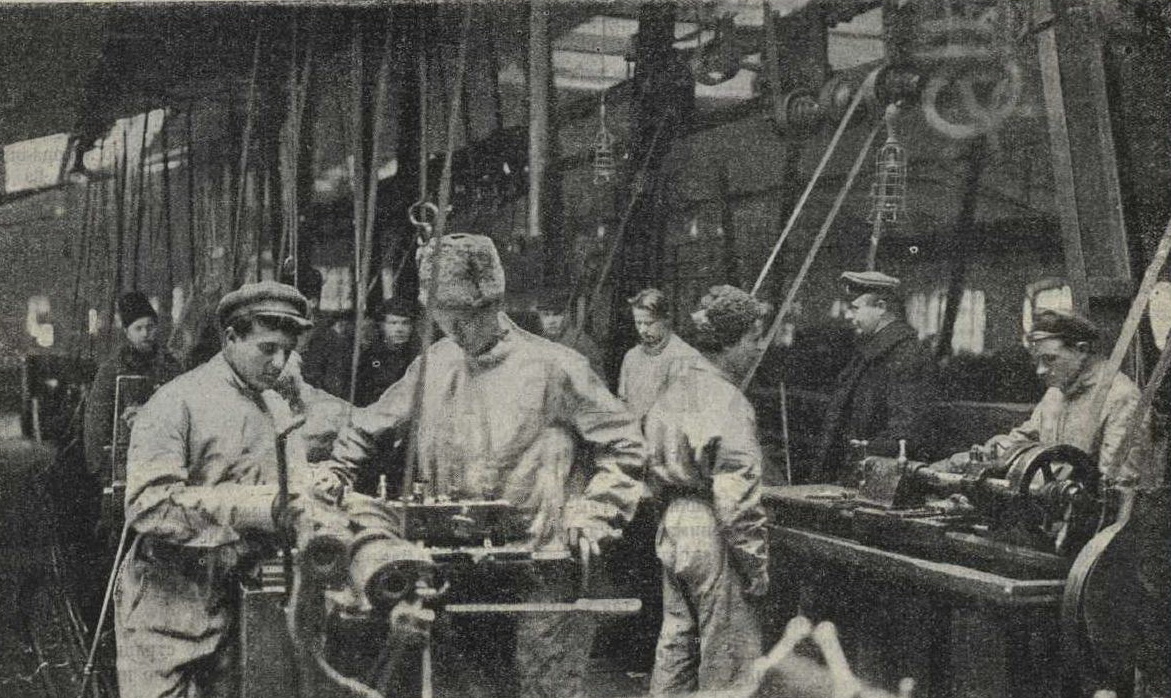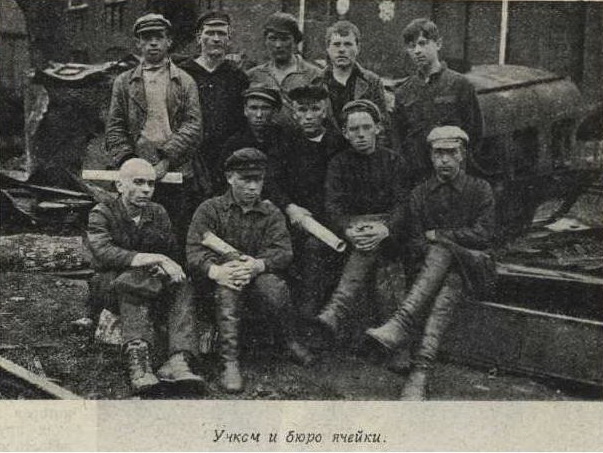Managing companies based on creative enthusiasm. Historical experience
The theme of combining labor enthusiasm and the success of the company as a whole is not uncommon on Megamind. But, unfortunately, the practice of our country shows that for the most part examples of a successful combination of the interests of employees and the interests of companies are the destiny of relatively small companies. There are many reasons for this and sad reasons ...
But in the history of the country there was a period when one of the foundations of the economy was the enthusiasm of employees! Let's see how it was and draw conclusions?
So. A little less than a hundred years ago. After a decade of war, the economy is in ruins. Trade embargo. A huge number of illegal armed formations of the most motley composition - from those who have fundamental disagreements with the victorious government, to criminals. Deputy GPU Unshlikht reports :
It would seem how far away from us, but you just have to rephrase a little: The
economic condition of the Russian Federation is characterized by the following main points:
1) the deterioration of macroeconomic development indicators of the main sectors of the economy;
2) speculation based on rumors of Putin’s illness;
3) the introduction of regular anti-Russian sanctions and constant rumors about the possibility of war;
3) the constant growth of IT threats.
The deterioration of the economic condition. The most important issue of the moment is the sharp deterioration in the state of our industry, expressed in the phasing out of enterprises in many of its sectors as a result of the financial crisis. The crisis particularly affected the state of enterprises dependent on the supply of components from abroad, as well as small and medium-sized enterprises, depending on the level of solvent demand of the population.
...
But let's not talk about sad things. On the other hand - the twenties - it is still the idealism of those who believe in a brighter future - the omnipotence of the bureaucracy and the total planning system is still far away.

But let's move on to the topic of the article. What was the organization of labor?
On the part of employees, management was carried out by working committees:

Perhaps one can say that in that period - the period of a severe economic crisis - without relying on involving the broad masses of the population in the management system, the country's withdrawal from the economic crisis was not possible. Unfortunately, this experiment was curtailed and emasculated. The same trade unions exist today - but has anyone seen their real participation in economic management?
What should this experience teach us? It is not enough to create a company or team combining the interests of its members and the interests of the company. It is necessary to create a self-sustaining system so that after a few years the company does not turn into another hierarchical structure - with the preservation of enthusiastic descriptions in the press and nostalgic memories of the few remaining old people in the smoking room.
All quotes are taken here .
But in the history of the country there was a period when one of the foundations of the economy was the enthusiasm of employees! Let's see how it was and draw conclusions?
So. A little less than a hundred years ago. After a decade of war, the economy is in ruins. Trade embargo. A huge number of illegal armed formations of the most motley composition - from those who have fundamental disagreements with the victorious government, to criminals. Deputy GPU Unshlikht reports :
The political and
economic situation of the Republic for April-May is characterized by the following main points: 1) the deterioration of the economic condition of the Republic;
2) anxious mood under the impression of a serious illness comrade Lenin, and then the English ultimatum and the possibility of an imminent war; finally,
3) the development of banditry characteristic of the spring period.
The deterioration of the economic condition. The most important issue of the moment is the sharp deterioration in the state of our industry, expressed in the phasing out of enterprises in many of its sectors as a result of the lack of sales and raw materials created by the financial crisis. Particularly severely, the crisis affected the state of enterprises that feed on imported raw materials (textile) and small-scale enterprises that depend directly on the market.
The curtailment of industry worsened the financial situation of workers, causing, on the one hand, the suspension of wage growth, and on the other, increasing unemployment.
Everywhere political gangsterism eats from abroad both replenishment and the organizers. In Ukraine, banditry is predominantly criminal in nature, but even here one can feel the leadership of counter-revolutionary organizations from abroad.
The mismanagement of the administration. Often enterprises experience a financial crisis due to the mismanagement of the administration.
Mismanagement is most often caused by the inexperience of enterprise managers.
The closure of enterprises is often also caused by sabotage of the administration and a certain desire to bring the company into a state of unprofitability in order to lease it. In a number of provinces, embezzlement and theft of factory property were registered.
The improvement in the material conditions of the workers that was outlined before May at the end of May is halted, and even a certain deterioration is planned in some places. The reason is the lack of rates noted by all industrial provinces, and the debt of enterprises to workers.
An increase in the material poverty of workers also causes an increase in the number of strikes.
It would seem how far away from us, but you just have to rephrase a little: The
economic condition of the Russian Federation is characterized by the following main points:
1) the deterioration of macroeconomic development indicators of the main sectors of the economy;
2) speculation based on rumors of Putin’s illness;
3) the introduction of regular anti-Russian sanctions and constant rumors about the possibility of war;
3) the constant growth of IT threats.
The deterioration of the economic condition. The most important issue of the moment is the sharp deterioration in the state of our industry, expressed in the phasing out of enterprises in many of its sectors as a result of the financial crisis. The crisis particularly affected the state of enterprises dependent on the supply of components from abroad, as well as small and medium-sized enterprises, depending on the level of solvent demand of the population.
...
But let's not talk about sad things. On the other hand - the twenties - it is still the idealism of those who believe in a brighter future - the omnipotence of the bureaucracy and the total planning system is still far away.
- In America, better organization of labor, better equipment and better workers.
If we have peace, we will have the same as in America.
- And how long will it take to achieve American standards?
- Maybe twenty years, maybe ten ... How do I know ... I think the French and Poles will not allow us to do this.
- And how long will it take to achieve American standards at this plant?
“Three to four years,” he said more optimistically.
The plant worked at half capacity compared to the pre-war period and produced only half of the pre-war production volumes.

But let's move on to the topic of the article. What was the organization of labor?
The director of the plant is assigned the solution of technical issues, problems of raw materials, finance, equipment, markets, organization of technological processes.
The human part of the work, the internal life of the plant, is managed by a working committee, employees who are on a salary but are selected by workers.
They also resolve all sorts of conflicts, sometimes separately, sometimes at meetings with plant management.
“What kind of conflict? Salary? Working hours?" I asked.
“No,” they answered me.
“Duration of work is determined by law, wages - by collective agreement.
But imagine that there is an agreement under which management is obliged to provide overalls for hot workshops and dirty work, to provide additional food for hard work.
Some workers believe that they should get it, and management believes that these workers are not subject to the conditions specified in the agreement.
There are disputes between workers.
All this is decided by us without resorting to management. ”
I told them that I myself had to understand that the effective work of the committee saved the leadership from solving many problems. He was apparently surprised that I was talking about such obvious things.
“Of course,” he said.
“We exist to help industry work well.”
“ Well, who is ultimately responsible for the efficiency of the enterprise ?” When you tell me that productivity per person is even higher than it was before the war, whose merit is it? ” I asked.
"A total merit , ”he replied.
“ It is in our common interests to make the plant work better. Only in this way can we achieve higher wages and improve life around us . The director is responsible for improving the technical conditions, and we care about people. ”
On the part of employees, management was carried out by working committees:

They are selected by the factory workers, these representatives are similar to our union leaders, however, here each concern concludes an agreement with the union, and the union representatives have their own office directly at the factory, solving problems that arise.
Perhaps one can say that in that period - the period of a severe economic crisis - without relying on involving the broad masses of the population in the management system, the country's withdrawal from the economic crisis was not possible. Unfortunately, this experiment was curtailed and emasculated. The same trade unions exist today - but has anyone seen their real participation in economic management?
What should this experience teach us? It is not enough to create a company or team combining the interests of its members and the interests of the company. It is necessary to create a self-sustaining system so that after a few years the company does not turn into another hierarchical structure - with the preservation of enthusiastic descriptions in the press and nostalgic memories of the few remaining old people in the smoking room.
All quotes are taken here .
